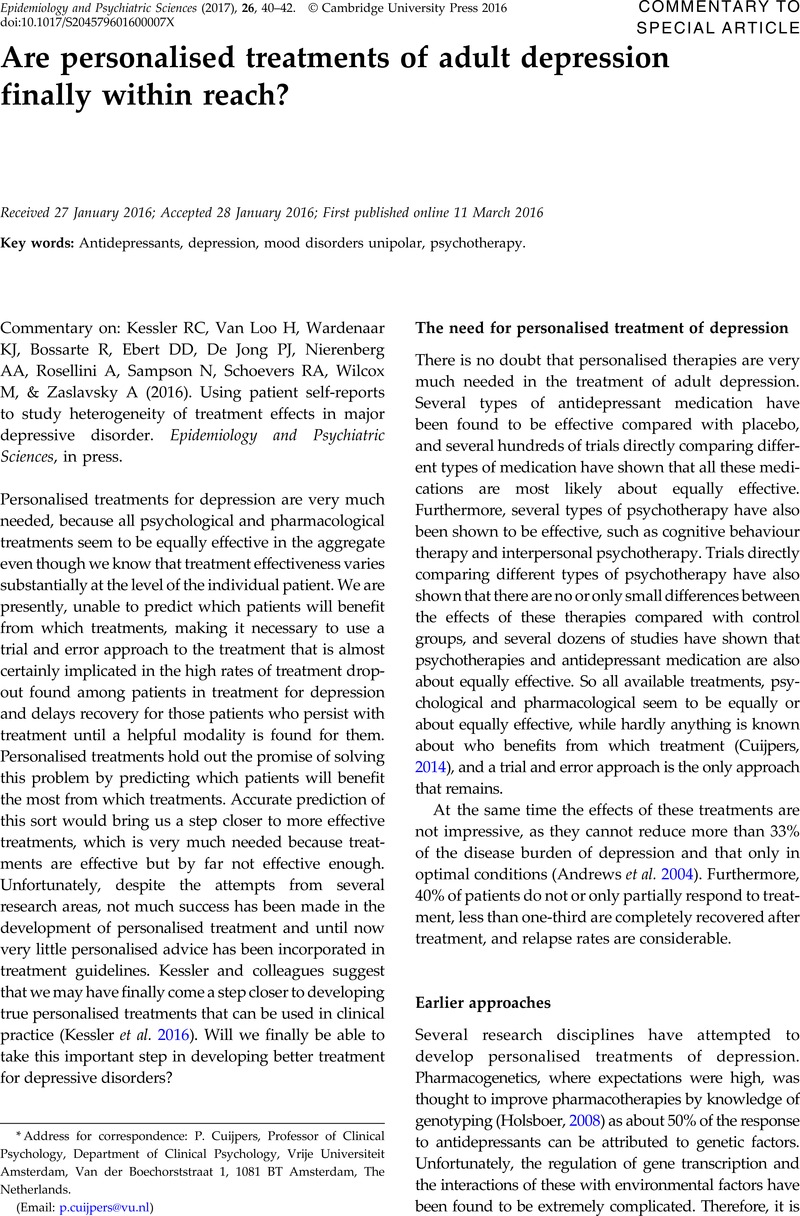Crossref Citations
This article has been cited by the following publications. This list is generated based on data provided by Crossref.
Deisenhofer, Anne‐Katharina
Delgadillo, Jaime
Rubel, Julian A.
Böhnke, Jan R.
Zimmermann, Dirk
Schwartz, Brian
and
Lutz, Wolfgang
2018.
Individual treatment selection for patients with posttraumatic stress disorder.
Depression and Anxiety,
Vol. 35,
Issue. 6,
p.
541.
Sugg, Holly Victoria Rose
Richards, David A
and
Frost, Julia
2018.
Morita Therapy for depression (Morita Trial): a pilot randomised controlled trial.
BMJ Open,
Vol. 8,
Issue. 8,
p.
e021605.
Sugg, Holly Victoria Rose
Frost, Julia
and
Richards, David A
2019.
Morita Therapy for depression (Morita Trial): an embedded qualitative study of acceptability.
BMJ Open,
Vol. 9,
Issue. 5,
p.
e023873.
Noma, Hisashi
Furukawa, Toshi A.
Maruo, Kazushi
Imai, Hissei
Shinohara, Kiyomi
Tanaka, Shiro
Ikeda, Kazutaka
Yamawaki, Shigeto
and
Cipriani, Andrea
2019.
Exploratory analyses of effect modifiers in the antidepressant treatment of major depression: Individual-participant data meta-analysis of 2803 participants in seven placebo-controlled randomized trials.
Journal of Affective Disorders,
Vol. 250,
Issue. ,
p.
419.
Sugg, Holly Victoria Rose
Frost, Julia
and
Richards, David A.
2020.
Personalising psychotherapies for depression using a novel mixed methods approach: an example from Morita therapy.
Trials,
Vol. 21,
Issue. 1,
Furukawa, Toshi A
Debray, Thomas P A
Akechi, Tatsuo
Yamada, Mitsuhiko
Kato, Tadashi
Seo, Michael
and
Efthimiou, Orestis
2020.
Can personalized treatment prediction improve the outcomes, compared with the group average approach, in a randomized trial? Developing and validating a multivariable prediction model in a pragmatic megatrial of acute treatment for major depression.
Journal of Affective Disorders,
Vol. 274,
Issue. ,
p.
690.
Maruo, Kazushi
Furukawa, Toshi A.
Noma, Hisashi
Imai, Hissei
Ikeda, Kazutaka
and
Yamawaki, Shigeto
2020.
Qualitative treatment-subgroup interactions in the antidepressant treatment of major depression: Application of QUINT to individual participant data from seven placebo-controlled randomized controlled trials.
Personalized Medicine in Psychiatry,
Vol. 21-22,
Issue. ,
p.
100054.
Purgato, Marianna
Tedeschi, Federico
Betancourt, Theresa S.
Bolton, Paul
Bonetto, Chiara
Gastaldon, Chiara
Gordon, James
O’Callaghan, Paul
Papola, Davide
Peltonen, Kirsi
Punamaki, Raija‐Leena
Richards, Justin
Staples, Julie K.
Unterhitzenberger, Johanna
de Jong, Joop
Jordans, Mark J.D.
Gross, Alden L.
Tol, Wietse A.
and
Barbui, Corrado
2020.
Mediators of focused psychosocial support interventions for children in low‐resource humanitarian settings: analysis from an Individual Participant Dataset with 3,143 participants.
Journal of Child Psychology and Psychiatry,
Vol. 61,
Issue. 5,
p.
584.
Seow, Lillian L. Y.
Page, Andrew C.
and
Hooke, Geoff R.
2020.
Severity of borderline personality disorder symptoms as a moderator of the association between the use of dialectical behaviour therapy skills and treatment outcomes.
Psychotherapy Research,
Vol. 30,
Issue. 7,
p.
920.
Maslej, Marta M.
Furukawa, Toshiaki A.
Cipriani, Andrea
Andrews, Paul W.
and
Mulsant, Benoit H.
2020.
Individual Differences in Response to Antidepressants.
JAMA Psychiatry,
Vol. 77,
Issue. 6,
p.
607.
Sugg, Holly V. R.
Richards, David A.
and
Frost, Julia
2020.
What is Morita Therapy? The Nature, Origins, and Cross-Cultural Application of a Unique Japanese Psychotherapy.
Journal of Contemporary Psychotherapy,
Vol. 50,
Issue. 4,
p.
313.
Miggiels, M. F.
ten Klooster, P. M.
Bremer-Hoeve, S.
Dekker, J. J. M.
Huibers, M. J. H.
Reefhuis, E.
Van, H. L.
and
van Dijk, M. K.
2021.
The D*Phase-study: study protocol for a pragmatic two-phased, randomised controlled (non-inferiority) trial that addresses treatment non-response and compares cognitive behavioural therapy and short-term psychodynamic supportive psychotherapy for major depression.
BMC Psychiatry,
Vol. 21,
Issue. 1,
Maslej, Marta M.
Furukawa, Toshiaki A.
Cipriani, Andrea
Andrews, Paul W.
Sanches, Marcos
Tomlinson, Anneka
Volkmann, Constantin
McCutcheon, Robert A.
Howes, Oliver
Guo, Xin
and
Mulsant, Benoit H.
2021.
Individual Differences in Response to Antidepressants.
JAMA Psychiatry,
Vol. 78,
Issue. 5,
p.
490.
Purgato, Marianna
Singh, Rakesh
Acarturk, Ceren
and
Cuijpers, Pim
2021.
Moving beyond a ‘one-size-fits-all’ rationale in global mental health: prospects of a precision psychology paradigm.
Epidemiology and Psychiatric Sciences,
Vol. 30,
Issue. ,
Høstmælingen, Andreas
Ulvenes, Pål
Nissen‐Lie, Helene Amundsen
Eielsen, Mikkel
and
Wampold, Bruce E.
2021.
Comparing outcomes in chronic depression following inpatient psychotherapy for patients continuing versus discontinuing antidepressant medication.
Clinical Psychology & Psychotherapy,
Vol. 28,
Issue. 5,
p.
1111.
Beatty, Lisa
Kemp, Emma
Turner, Jane
Butow, Phyllis
Milne, Donna
Yates, Patsy
Lambert, Sylvie
Wootten, Addie
and
Koczwara, Bogda
2021.
Moderators of intervention efficacy for Finding My Way: A web-based psychosocial intervention for cancer-related distress.
Supportive Care in Cancer,
Vol. 29,
Issue. 12,
p.
7669.
Sarter, Lena
Heider, Jens
Kirchner, Lukas
Schenkel, Sandra
Witthöft, Michael
Rief, Winfried
and
Kleinstäuber, Maria
2021.
Cognitive and emotional variables predicting treatment outcome of cognitive behavior therapies for patients with medically unexplained symptoms: A meta-analysis.
Journal of Psychosomatic Research,
Vol. 146,
Issue. ,
p.
110486.
Sarter, Lena
Heider, Jens
Witthöft, Michael
Rief, Winfried
and
Kleinstäuber, Maria
2022.
Using clinical patient characteristics to predict treatment outcome of cognitive behavior therapies for individuals with medically unexplained symptoms: A systematic review and meta-analysis.
General Hospital Psychiatry,
Vol. 77,
Issue. ,
p.
11.
Owens, Matthew
and
Bunce, Hannah L. I.
2022.
Nature-Based Meditation, Rumination and Mental Wellbeing.
International Journal of Environmental Research and Public Health,
Vol. 19,
Issue. 15,
p.
9118.
Owens, Matthew
and
Bunce, Hannah L. I.
2022.
The Potential for Outdoor Nature-Based Interventions in the Treatment and Prevention of Depression.
Frontiers in Psychology,
Vol. 13,
Issue. ,






Target article
Using patient self-reports to study heterogeneity of treatment effects in major depressive disorder
Related commentaries (2)
Are personalised treatments of adult depression finally within reach?
Targeting treatments for depression: what can our patients tell us?